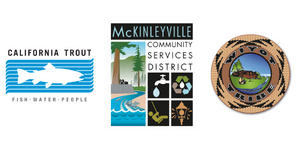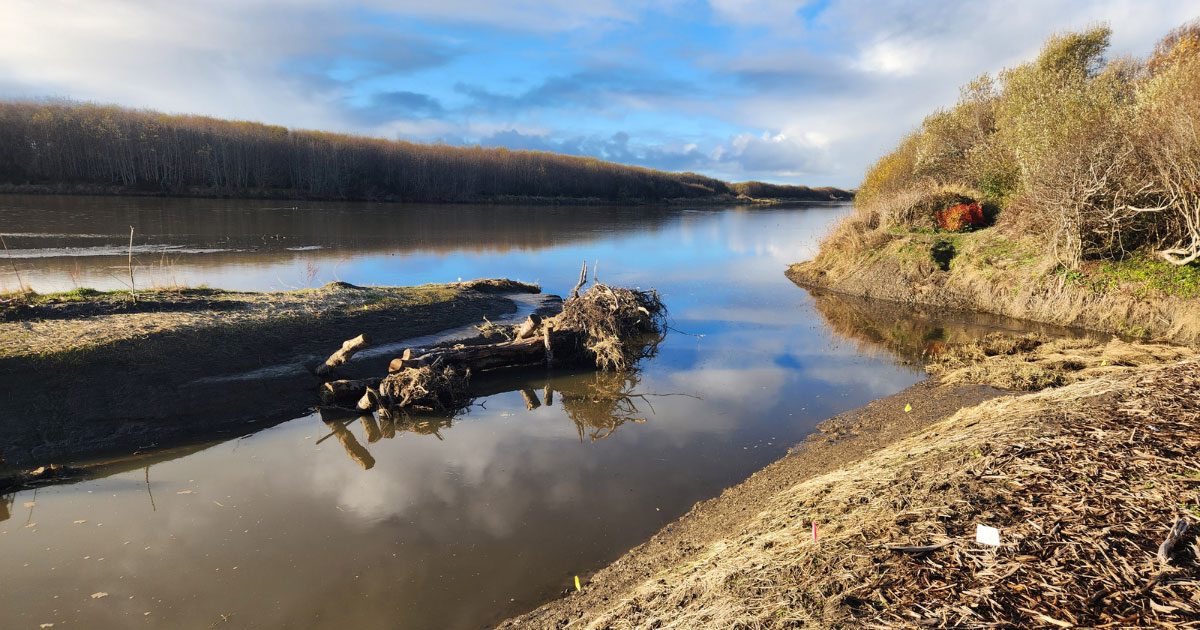Press Release: Baduwa’t (Mad River) Estuary Restoration and Public Access Project Completed

FOR IMMEDIATE RELEASE
December 15, 2022
Baduwa’t (Mad River) Estuary Restoration and Public Access Project Completed
California Trout, McKinleyville Community Services District, Wiyot Tribe and partners celebrate restored salmon habitat north of Eureka, new public access trail open
McKINLEYVILLE, Calif. – Nonprofit research and conservation organization California Trout, McKinleyville Community Services District (MCSD), the Wiyot Tribe, and other partners, have completed an important Baduwa’t estuary restoration and reconnection project. The project opens up more than 4 acres of important habitat for imperiled salmon and steelhead while increasing public access to an inspiring coastal viewpoint overlooking the Baduwa’t, also known as the Mad River, in Humboldt County.
“Fish habitat is really limited on the lower Baduwa’t, so this project is going to make an outsized difference for juvenile salmon and steelhead,” said Mary Burke, CalTrout’s North Coast Regional Manager. “We took an unused wastewater facility next to the river and turned it back into healthy habitat, while adding an inspiring new coastal overlook trail. The project is a terrific example of a local government agency, Tribal representatives, a nonprofit, and a suite of local firms that stewards a concept through to construction, working together to benefit the public and wildlife.”
Located in the tidal zone 3 miles from the river mouth, the project is on land owned by MCSD. The restoration project involved decommissioning two outdated, unused wastewater percolation ponds and restoring them to floodplain habitat, removing invasive plant species, revegetating with native plants, and building channels to connect the new wetlands and ponds to the river.
The new public trail begins near the foot of School Road and includes an ADA-accessible loop with two coastal overlooks, outfitted with benches and a picnic table. A kiosk and set of interpretive panels will be added in 2023. Humboldt County constructed ADA parking and three asphalt parking spaces. The site is easy to walk and bike to, as it is connected to the School Road Trail and the regional Hammond Trail – a part of the California Coastal Trail – that is used by local residents, Coastal Trail hikers, and touring cyclists. MCSD wishes to remind the public that the site is open to dogs if they are on a leash, in order to be sure all users are comfortable relaxing at the viewpoints and to protect the local wildlife and newly seeded and planted landscape.
The Wiyot Tribe, whose ancestral territory encompasses the lower Baduwa’t, are a critically important partner on this project, working with CalTrout, Redwood Coast Action Agency, and MCSD to develop interpretive signage for the new trails. The signs are being developed collaboratively to include Wiyot perspectives, including the Indigenous language and cultural importance of this landscape. Signs will also provide information about the estuary and will welcome and orient people on many ways to connect to this site.
“The Wiyot Tribe is proud to work with our partners Cal Trout and McKinleyville Community Service District on the Baduwa’t Estuary Restoration and Public Access project. We are happy to see it completed” Ted Hernandez, Wiyot Tribal Chairman stated. “This restoration project will help our salmon and steelhead population grow back to what it once was during the time of our ancestors. I am also looking forward to the public being able to use it so they can see why our ancestors called it home. Baduwa’t is such a beautiful river and is very majestic. It is one of the Wiyot’s lifelines. Baduwa’t is just one of the rivers we care about as Wiyot people. We also look forward to caring for Baduwa’t sister rivers in Wiyot’s ancestral territory in the months and years to come. It is our responsibility that the creator has given us.”
The project increases the amount of overwintering habitat in the Baduwa’t estuary for federally threatened Southern Oregon Northern California Coast coho salmon, federally threatened California Coastal Chinook salmon, and federally threatened Northern California steelhead. Improvements in habitat quality and quantity may also benefit other sensitive aquatic species, including tidewater goby, eulachon, and longfin smelt.
The Baduwa’t drains 497 square miles over a length of roughly 100 miles to the Pacific Ocean, reaching the coast six miles north of Humboldt Bay. The river offers close to 50 miles of spawning and rearing habitat; however, logging, agriculture, and flood control infrastructure have altered the estuary, severely limiting habitat that is needed to support juvenile salmon and steelhead during winter or on their way out to sea.
“It’s one thing to read about this project in the newspaper, but we really hope people will come out and walk or bike the new trail, and we’re happy to see that happening already,” added Patrick Kaspari, General Manager of the McKinleyville Community Services District. “The intent is to someday have a trail all along this stretch of the river, not only to appreciate the restoration work that’s been done here, but to facilitate people’s connection to the river and support alternative transportation options. The Mad River/Baduwa’t estuary is a special, unique place and anything the District can do to facilitate people’s connection to it is a very worthwhile endeavor.”
The $2 million project was funded by California State Coastal Conservancy, Wildlife Conservation Board, US Fish and Wildlife Service, and National Oceanic and Atmospheric Administration (NOAA) Restoration Center, and with design funding from California Department of Fish and Wildlife’s Fisheries Restoration Grant Program. It was also supported by increased capacity and funding from the Redwood Community Action Agency, California Conservation Corps, California Alternatives to Toxics and through a Supplemental Environmental Project of the California Department of Transportation; and through the in-kind work of McKinleyville Community Services District and the County of Humboldt. The project benefited from the dedication of local expertise, including Northern Hydrology and Engineering, GHD; McBain Associates, SHN; local professionals who provided trail design, rare plants, and wildlife habitat assessments; Samara Restoration; the CA CCC and the Redwood Community Action Agency; and Cal Poly Humboldt. Also thanks to John Northmore Roberts and Associates for trails design work, and Kernan Construction and Miller Farms, local contractors whose teams moved the earth and installed the new access amenities.
CalTrout and other project partners will hold an opening ceremony for the project on December 21st at 10 a.m., at the new trailhead on School Road in McKinleyville.
About California Trout
California Trout partners with numerous government agencies, Tribes, and conservation groups to conduct research, habitat restoration and advocacy, to restore vibrance and abundance to California’s freshwater ecosystems and to keep them that way for years to come. Founded in 1971, CalTrout has been working for more than 50 years to protect salmon and steelhead strongholds, reconnect fish habitat, integrate fish and working lands, steward source water areas, and restore estuaries. Learn more at https://caltrout.org.
###
Cover photo by Mike Wier.





